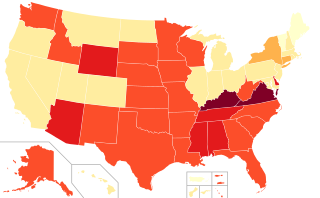In United States criminal law, probable cause is the standard by which police authorities have reason to obtain a warrant for the arrest of a suspected criminal or the issuing of a search warrant. It is also the standard by which grand juries issue criminal indictments. The principle behind the standard is to limit the power of authorities to perform random or abusive searches, and to promote lawful evidence gathering and procedural form during criminal arrest and prosecution. The standard also applies to personal or property searches.
Imprisonment in law is the specific state of being physically incarcerated or confined in an institutional setting such as a prison. Courts of the United States, including the U.S. Supreme Court, have recognized that the minimum period in an indeterminate sentence that was actually imposed by a court of law is the official term of imprisonment. In other words, any "street time" that was ordered by the court as part of the defendant's punishment does not constitute term of imprisonment.

Parole is the early release of a prisoner who agrees to abide by certain conditions, originating from the French word parole. The term became associated during the Middle Ages with the release of prisoners who gave their word.
Probation in criminal law is a period of supervision over an offender, ordered by the court instead of serving time in prison.
Probation and Parole Officers play a role in the criminal justice systems by supervising offenders released from prison or sentenced to non-custodial sanctions such as community service. In some jurisdictions probation and parole officers are involved in presenting reports on offenders and making sentencing recommendation to courts of law.

Muntaqim v. Coombe, 449 F.3d 371, was a legal challenge to New York State’s law disenfranchising individuals convicted of felonies while in prison and on parole. The plaintiff, Jalil Abdul Muntaqim who is serving a life sentence, argues that the law has a disproportionate impact on African Americans and therefore violates Section 2 of the federal Voting Rights Act as a denial of the right to vote on account of race.
Right to counsel means a defendant has a right to have the assistance of counsel and, if the defendant cannot afford a lawyer, requires that the government appoint one or pay the defendant's legal expenses. The right to counsel is generally regarded as a constituent of the right to a fair trial. Historically, however, not all countries have always recognized the right to counsel. The right is often included in national constitutions. 153 of the 194 constitutions currently in force have language to this effect.
Gerald Hector Scarpelli was a hitman for the Chicago Outfit criminal organization who later became a government witness.
Ewing v. California, 538 U.S. 11 (2003), is one of two cases upholding a sentence imposed under California's three strikes law against a challenge that it constituted cruel and unusual punishment in violation of the Eighth Amendment. As in its prior decision in Harmelin v. Michigan, the United States Supreme Court could not agree on the precise reasoning to uphold the sentence. But, with the decision in Ewing and the companion case Lockyer v. Andrade, the Court effectively foreclosed criminal defendants from arguing that their non-capital sentences were disproportional to the crime they had committed.
Eugene E. "Gene" Stipe was an American politician from Oklahoma. He was a member of the Democratic Party.
Morrissey v. Brewer, 408 U.S. 471 (1972), was a United States Supreme Court case that provided for a hearing, before a "neutral and detached" hearing body such as a parole board, to determine the factual basis for parole violations. This hearing is colloquially known as a "Morrissey hearing."
The Patuxent Institution is located in Jessup, Maryland one mile east of US Route 1 on Maryland Route 175. It is a treatment-oriented maximum-security correctional facility. With a maximum static capacity of 987 beds, it offers the most diverse services to the most varied male and female offender population in the state, and possibly in the nation. Patuxent Institution is the only institution for sentenced criminals in Maryland that is not part of the Maryland Department of Public Safety and Correctional Services. Its foundation lies in the Maryland Public General Law, codified as Title 4 of the Correctional Services Article. The predecessor of this statute, Article 31B of the Public General Laws of Maryland, was enacted in 1951.
Marsy's Law, the California Victims' Bill of Rights Act of 2008, enacted by voters as Proposition 9 through the initiative process in the November 2008 general election, is an amendment to the state's constitution and certain penal code sections. The act protects and expands the legal rights of victims of crime to include 17 rights in the judicial process, including the right to legal standing, protection from the defendant, notification of all court proceedings, and restitution, as well as granting parole boards far greater powers to deny inmates parole. Passage of this law in California has led to the passage of similar laws in Florida, Georgia, Illinois, Kentucky, Nevada, North Carolina, Oklahoma, Ohio and Wisconsin, and efforts to pass similar laws in Hawaii, Iowa, Montana, Idaho, South Dakota, and Pennsylvania. In November 2017, Marsy's Law was found to be unconstitutional and void in its entirety by the Supreme Court of Montana for violating that state's procedure for amending the Montana Constitution.

United States federal probation and supervised release are imposed at sentencing. The difference between probation and supervised release is that the former is imposed as a substitute for imprisonment, or in addition to home detention, while the latter is imposed in addition to imprisonment. Probation and supervised release are both administered by the U.S. Probation and Pretrial Services System. Federal probation has existed since 1909, while supervised release has only existed since 1987, when it replaced federal parole as a means for imposing supervision following release from prison.
A rehabilitation policy is one intending to reform criminals rather than punish them and/or segregate them from the greater community.
Hawaii's Opportunity Probation with Enforcement (HOPE) is an intensive supervision program that aims to reduce crime and drug use while saving taxpayers' dollars spent on jail and prison costs. HOPE deals with offenders who have been identified as likely to violate the conditions of their probation or community supervision.
The Texas Board of Pardons and Paroles (BPP) is a state agency that makes parole and clemency decisions for inmates in Texas prisons. It is headquartered in Austin, Texas.

Felony disenfranchisement in the United States is the suspension or withdrawal of voting rights due to conviction of a criminal offense. The actual class of crimes that results in disenfranchisement vary between jurisdictions, but most commonly classed as felonies, or may be based on a certain period of incarceration or other penalty. In some jurisdictions disfranchisement is permanent, while in others suffrage is restored after a person has served a sentence, or completed parole or probation. Felony disenfranchisement is one among the collateral consequences of criminal conviction and the loss of rights due to conviction for criminal offense. In 2016, 6.1 million individuals were disenfranchised on account of a conviction, 2.47% of voting-age citizens. As at October 2020, it was estimated that 5.1 million voting-age US citizens were disenfranchised for the 2020 presidential election on account of a felony conviction, 1 in 44 citizens.
United States v. Haymond, 588 U.S. ___ (2019), is a case in which the U.S. Supreme Court struck down 18 U.S.C. § 3583(k)'s five-year mandatory minimum prison sentence for certain sex offenses committed by federal supervised releasees as unconstitutional unless the charges are proven to a jury beyond a reasonable doubt. Justices Ginsburg, Sotomayor, and Kagan joined Gorsuch's plurality opinion, while Breyer provided the necessary fifth vote with his narrow concurrence that began by saying he agreed with much of Justice Alito's dissent, which was joined by Justices Roberts, Thomas, and Kavanaugh.

Lifetime probation is reserved for relatively serious legal offenders. The ultimate purpose of lifetime probation is to examine whether offenders properly maintain good behavior as well as capability of patience under lifetime probation serving circumstance. An offender is required to abide by particular conditions for rest of his or her entire life in order to nurture superior social behaviour as a punishment for their criminal offence. Condition of probation orders contain supervision, electronic tagging, reporting to his or her probation or parole officer, as well as attending counselling. The essential component of lifetime probation carries the sense of being examined for well-being character and behaviour for life term period. Legislative framework regarding probation may vary depending on the country or the state within a certain country as well as the duration and condition of probational sentencing.





